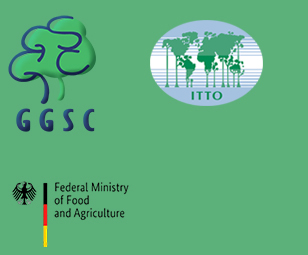
Gabon
Space cooperation: AGEOS and LASAC join hands to support environmental monitoring in Gabon
On October 22, during the China-Africa Satellite Remote Sensing Application Cooperation Center 2025 Conference Week (CACSA Week 2025) held in Deqing, China, the Gabonese Agency for Space Studies and Observations (AGEOS) signed a memorandum of strategic cooperation with the Land Satellite Remote Sensing Application Center (LASAC), an institution under China's Ministry of Natural Resources. This agreement grants Gabon the license to utilize China's high-resolution satellite imagery, aiming to enhance the country's capabilities in forest conservation, combating illegal exploitation of natural resource, etc.
Local media in Gabon said that the imagery will facilitate precise insights into changes in forest coverage, infrastructure development, watershed management, and protected areas. For a country where nearly 88% of its land is covered by tropical forests, this undoubtedly marks a significant step forward.
Gabon launches forestry tax reform and establishes joint committee to prevent revenue loss
On October 16, Maurice Ntossui Allogo, Gabon's Minister of Water and Forests, convened representatives from economic, tax, customs, forestry, and industrial sectors to jointly initiate a large-scale forestry tax reform. The objective is to enhance transparency, ensure traceability of tax revenues, and secure sustainable financial support for public policies related to forests and biodiversity.
The forestry and timber industry remains one of Gabon's economic pillars, accounting for nearly 60% of its non-oil exports. However, tax revenues derived from this natural resource are still below their deserved levels. To reverse this situation, the Ministry of Water and Forests plans to establish a permanent joint committee, bringing together key agencies such as customs, tax authorities, and forestry departments. This committee will be responsible for cross-verifying tax and forestry information to prevent revenue losses and ensure that every cubic meter of logged timber genuinely contributes to the national treasury. This coordinated institutional approach will also help identify discrepancies between the quantities declared by operators and actual export volumes.
Republic of the Congo
Congo Basin Forest Ecosystem Accounts report and Policy Recommendations released
The World Bank's October 20 report, Congo Basin Forest Ecosystem Accounts and Policy Recommendations, notes that the Congo Basin, home to the world's second-largest tropical rainforest, holds immense value for not only the six countries it spans, but for the planet. The report reveals the region's forests are not only essential for climate stability and biodiversity, but also a foundation for economic resilience. The value of forest ecosystem services nearly doubled in just two decades, rising from $590 billion in 2000 to $1.15 trillion in 2020. During the same period, the total forest asset value surged from $11.4 trillion to $23.2 trillion.
The report shows that forest management, conservation, and data readiness vary widely across the region. Countries such as Gabon and the Republic of Congo stand out, embedding forest sustainability into national planning with relatively low deforestation rates and strong biodiversity indicators.
The Congo launches update of National Sustainable Development Strategy
On October 27, Arlette Soudan-Nonault, Minister of Environment, Sustainable Development, and the Congo Basin, initiated the revision of the National Sustainable Development Strategy (Stratégie nationale de développement durable, SNDD) in Brazzaville. This effort aims to address current climate and socio-economic challenges. Since its adoption in 2015, the strategy has served as the foundation for public policies on sustainable development, social inclusion, and environmental protection. The update will focus on five key objectives: integrating sustainable development into all public policies; reducing poverty and inequality while conserving natural resources; promoting a green and resilient economy; enhancing participatory governance and transparency; and ensuring alignment between national policies and international commitments.
Ghana
New L.I. to stop mining in forest reserves laid in Parliament
On October 31, Emmanuel Armah-Kofi Buah, Ghana's Minister of Lands and Natural Resources, submitted the Environmental Protection (Mining in Forest Reserves) Revocation Instrument to Parliament, aiming to fully revoke the presidential authority to authorize mining activities within forest reserves and establish stringent protection mechanisms for Ghana's forest ecosystems.
During a press conference, Buah stated that following comprehensive consultations and reviews, the government had decided to respond to persistent public calls by completely revoking the L.I 2501 regulation, which had originally granted the president such authority. He recalled that L.I. 2501, which took effect on June 2, 2025, had already removed Section 32 of the original regulation to restrict the presidential power, and following this revocation, management would rely entirely on guidelines issued in 2020.
African timber export tax storm hits: supplier costs soar, international prices surge
Hugh C. A. Brown, CEO of the Ghana Forestry Commission, reaffirmed on X recently: “Legal compliance is the passport for African timber.”
On October 28, the Ghana Revenue Authority (GRA) launched surprise audits on 10 major timber exporters, uncovering VAT underreporting, with total fines exceeding GHS 2 million.
Driven by the EU Deforestation Regulation (EUDR) mandatory traceability requirements and intensified tax audits across multiple countries, suppliers in major timber-producing nations in Africa like Ghana, Cameroon, and Gabon have broadly raised quotes. In the last week of October, international log and sawn timber prices rose an average of 7.2% in one week, with some hardwoods climbing as high as 12%.

| E-mail:ggsc@itto-ggsc.org | Tel:86-10-62888626 |


Sigh Up for Emails |
|